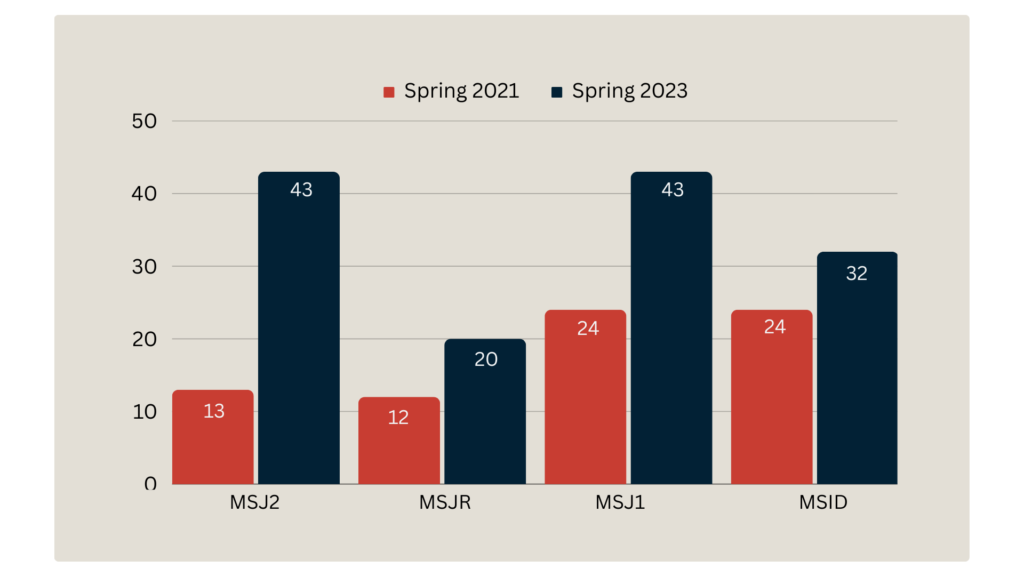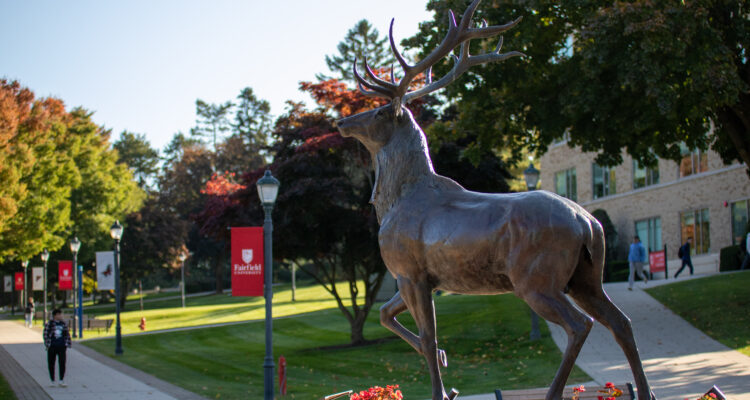When Fairfield University implemented its Magis Core curriculum in 2019 for the Class of 2023 and beyond, it was featured as an innovative curriculum that reduced the number of required courses by five, from 20 to 15, and introduced “signature elements”, such as social justice and intensive writing courses.
However, the Magis Core curriculum has been the center of multiple complaints due to the university’s lack of preparation during the implementation phase of the core and the limited number of Social Justice (SJ) courses offered. In April 2022, Professor Elizabeth Petrino, then-Chair of the Magis Core, wrote a letter to the editor addressing student concerns regarding the social justice classes,
In her letter, Petrino attributed the SJ course offering problems to increased enrollment at Fairfield and a rapid execution of the Magis Core. “We were committed to offering the core curriculum with Signature Elements before sufficient courses had been approved,” said Petrino on the university’s decision to implement the core with the Class of 2023. “The result has been that we began with fewer courses than we needed, and we are still in need of more.”
The troubles with obtaining SJ attributes even contributed to the Magis Core Curriculum Committee waiving specific SJ2 and SJR attributes for students graduating in 2024. The changes meant that students only had to take three courses with social justice attributes, regardless of the classification.
“We did note in particular that we see that the SJ element needs for the Class of 2024, there was a lack there in terms of which courses students were able to fulfill,” Petrino mentioned to The Mirror back in May 2023.
Five years after its rushed implementation, university officials are celebrating finally getting enough courses to meet the demands of students.
“I think we are in a pretty good place, I think we are pretty close,” said Dr. Glenn Sauer, the new director of the Magis Core when asked about the status of social justice course offerings. “We did make the decision, I think at the end of last spring, that any members of the class of 2024 could use any three SJ elements to meet their requirements, but we expect that after this year everybody from the class of 2025 [and] further should be able to meet [the SJ requirements] using the regular registration process.”
He went further to state that Fairfield “should have enough courses” for students to meet the Magis Core social justice requirements within their four years at Fairfield, contingent on enrollments not rising dramatically.
Sauer also explained that the Magis Core Committee adds courses to their approved lists on a monthly basis and they have worked to incentivize the submission of additional signature element courses by faculty with a cash stipend. As a result of a campaign to get professors to submit courses for SJ approval, Bauer confirmed the SJ committee received 81 proposals for the spring semester. A similar number of proposals are expected for next year.
In a separate statement, College of Arts and Sciences (CAS) Dean Richard Greenwald, Ph.D. also confirmed the rise in courses with social justice attributes and alluded to a continuation of the recent trend.
“CAS takes its responsibility in offering the Core seriously and has been working tirelessly to provide the needed courses that meet the rigorous curriculum. I am pleased to see the number of SJ courses increasing, and I expect to see many more added very soon,” said Greenwald to The Mirror.

An independent search by The Mirror confirmed that courses with Social Justice attributes have increased in the previous years. Spring 2023 social justice courses saw an 82% offering increase compared to the number of courses offered in spring 2021.
Social Justice 2 saw a 230% increase over two years, with 43 courses being offered for this semester compared to the 13 available for the spring of 2021. Meanwhile, MSJ1 now has almost twice as many courses compared to 2021, with 19 more courses being offered.
Social Justice Race, one of the most difficult courses to find due to its low availability, saw a 66% increase over the two-year period. For the next semester, students can select any of the 20 classes that offer the race attribute. Out of the 20, six courses are offered as Religious Studies classes, while the music and history departments both offer four classes each.
Asked whether the College of Arts and Sciences should carry all the weight of social justice offerings, Professor Bauer said that the perception relies on the way the Magis Core proposal was designed.
“The original Magis Core proposal, which was approved by the faculty university-wide, was that all of the courses would come from the College of Arts and Sciences,” explained Sauer, who is also a Biology professor.
He emphasized that over time and in consultation with the other university schools, attributes such as WID, Writing In the Discipline, were developed so students could take writing courses within their major.
On this, he went further to explain that “we are getting courses from across the university and I would imagine that we will continue to expand going forward.” Because the humanities, sciences and math are foundational elements to Jesuit education, Bauer explained that students should still see a great number of Magis Core courses coming from the College of Arts and Sciences.
Students, however, feel like the process of classes obtaining social justice attributes could be improved and more proactive.
“I feel as though more classes should be counted [towards] the Social Justice requirements. There are little to no classes available for the SJ attributes that I need, and the ones available require prerequisites that I do not have,” said sophomore student Jessie Beart-Caruso.
She also mentioned her shock at realizing her Culturally Responsive Teacher class, an education whose course description emphasizes discussions on students’ racial, cultural and ethnic backgrounds. The course, taught by Student Diversity and Multicultural Affairs Director, Yolehema Felican ‘12, only has an “Educational Studies Diversity” attribute.
In his statement to The Mirror, the CAS dean explained the “complexity” of redesigning existing courses to accommodate social justice attributes.
“The faculty member must submit their new course to the Magis Core Curriculum Committee through the attributes subcommittee. Once approved by the subcommittee, it goes to the full committee and then the Arts & Sciences Curriculum Committee, and then to the University Curriculum Committee,” said Greenwald.
However, while professors enlist their courses for the lengthy review process and more courses are added, Dr. Bauer encourages students to work with their advisors to identify courses that meet the student’s particular needs and interests.
“We do really encourage students to work with their advisors to identify not only a course that just meets a signature element object, but is it one that’s interesting to you, and is it one that in some way relates to your overall program of study?”


Leave a Reply